- Home
- Ann M. Martin
Snow War Page 3
Snow War Read online
Page 3
“Mr. Morton? Could I take a tray with me to the playground today?” he asked. “Please?”
“What for?” asked Mr. Morton. Ian told him his great idea, and Mr. Morton said, “Well, I don’t see why not. Go ahead.”
So Ian zipped up his jacket, put on his hat and mittens, grabbed a cafeteria tray, and ran outside. He carried his tray to the top of the hill at the far end of the playground. Then he looked out at the rest of the playground. He saw his classmates trickling outside. Most of them stood around glumly. They looked sadly at their snowforts. Then they looked angrily at each other.
Well, thought Ian, I am not going to be all mad and bored and waste my recess.
Ian placed the tray in the snow at the top of the hill. He looked at the bottom of the hill. He thought of the X-ers hurtling through space. And then he knelt down, threw himself on the tray, pushed off with his feet, and … whoosh!
Ian was hurtling through space. He felt like an X-er.
He flew down the snowy hill on his stomach. The wind blew his hair back, and Ian could feel icy air on his cheeks.
At the bottom of the hill, the tray came to a gentle stop.
Yes! thought Ian.
Ian carried the tray back to the top of the hill. This time he sat on the tray and sailed down the hill on his bottom.
Hurtling through space, thought Ian. Now I know why the X-ers like space travel so much.
At the bottom of the hill, Ian found himself looking up at Chris and Omar. Their eyes were shining.
“Cool idea, Ian,” said Chris. “Can we try that?”
APOLOGIES
Ian, Omar, and Chris took turns flying down the hill on the tray.
“Hey, Brain! Was that your idea?” Ricky asked. He joined the boys at the bottom of the hill.
“It was Ian’s idea,” replied Chris.
“Oh, well … can I try it?”
“Maybe we should get another tray,” said Omar.
“Get two more. We want to try, too,” said Nancy.
The Three Musketeers had joined the boys. A bunch of the other girls were watching nearby.
In the end Mr. Morton gave the kids in Ms. Colman’s class six more trays. The kids spent the rest of recess flying down the hill. When the bell rang, they stacked the trays by the door to the cafeteria. Then they lined up to go inside.
“Ian?” said Audrey while they were waiting. “I am really sorry I threw that ice-ball at you. I did not mean to hit you, you know.”
“I know,” said Ian.
“And I should not have thrown it anyway. It could have hurt Ricky or whoever it hit. But I did not think about that. I was too mad.”
“It is okay,” said Ian. “My tooth was going to come out soon anyway. And the Tooth Fairy gave me double, since it was knocked out. I got two dollars. Now I have almost enough to buy another book about the X-ers. They are my favorite books.”
“Hannie,” said Terri, “I am sorry I threw a snowball at you. I threw the first one yesterday. So … sorry.”
“It is okay,” replied Hannie.
Leslie tapped Bobby on the shoulder. “I am sorry I smashed in the side of your fort,” she said.
Ian began to feel better. He was grinning. So was Audrey. So were Hannie and Terri and Leslie and Bobby. By the time the kids returned to their classroom, they were all smiling.
Ms. Colman smiled back at them. “Well,” she said. “What is going on here? You look awfully happy.”
“Ian had a good idea,” Sara told her. “We went sledding on trays on the playground today.”
“Ms. Colman?” said Audrey. “I told Ian I was sorry I threw the iceball at him. And I am sorry. Ian was not part of the snow war.”
“No,” said Leslie. “We got mad at Ian, but nothing was his fault.”
“You know what?” spoke up Karen. “I did not really want to be so mad at everyone, especially not over the silly forts. So I should say I am sorry to Bobby and Ricky and Omar and Hank and Chris and Leslie and Audrey and Tammy and Terri and Jannie.”
“We were not just mad at the other groups,” added Ricky. “After yesterday we were all mad at each other.”
“And at you, Ms. Colman,” said Natalie. “We are sorry.”
“I accept your apology,” said Ms. Colman.
Ian sat at his desk and waited. He was waiting to hear Ms. Colman say the thing he thought she should say. When she did not say it, Ian raised his hand. “Ms. Colman,” he began, “I think something is not fair. I think it is not fair that you told the whole class we could not go to the carnival if the snow war did not stop. Because I was not part of the snow war. Plus, I got hurt.”
“Ian, you are right,” agreed Ms. Colman. “That was not fair. I was not thinking. I guess I got as mad as the rest of you did. I am very, very sorry.” She paused. Then she smiled again and said, “I do not think we have to worry about the carnival anymore, though, do we? Is the snow war over?”
“Yes!” cried the kids in Ms. Colman’s class.
SNIP, SNIP, SNIP
Now that the snow war was over, the kids in Ms. Colman’s class could think about their snowflake booth again. And they had a lot of work to do.
“We need to build the booth,” said Ms. Colman. “Maybe some of your parents could do that. Then we will paint it. We have to finish our snowflakes, of course. Also, we must think up fortunes to write on them. And we need to go shopping for the prizes.”
Karen raised her hand. “My stepfather is a carpenter,” she announced. “I bet he would help build the booth.”
Ms. Colman called some of the parents after school. Four of them decided to help Karen’s stepfather build the booth in his workshop one Saturday. Meanwhile, in school, the kids worked on the snowflakes.
“We have only two weeks until the carnival,” said Ms. Colman one morning. “I think that for part of every day we should divide into two groups. Half of you will cut out snowflakes. I will help the rest of you think of fortunes and write them on the snowflakes. How does that sound?”
“But I want to make snowflakes and write fortunes!” cried Tammy. “Not just one or the other.”
“Then the groups can switch,” Ms. Colman replied.
On the first day Ian was part of the group writing fortunes. He and seven other kids joined Ms. Colman in the back of the room.
“I do not know what to write,” said Natalie. “How do I know what is going to happen to people? How can I tell their fortunes?”
“Natalie, we are not really telling fortunes. Are we, Ms. Colman?” said Karen. “We will just make things up.”
“The fortunes could be silly,” added Omar.
“Like ‘Be careful or you might kiss a frog today,’ ” said Leslie.
The kids giggled.
“How about ‘Do not bend over when you are wearing a dress or people will see your underwear’?” suggested Audrey.
“Not too silly,” said Ms. Colman. But she was smiling. “Also, remember that we have to be able to write the fortunes on the snowflakes, and there is not a lot of room. So keep the fortunes short.”
“I know,” said Ian. “How about ‘Smile, and someone will smile back at you.’ How is that?”
“Perfect,” said Ms. Colman.
So the kids wrote fortune after fortune. And they snip, snip, snipped away at their snowflakes. Ms. Colman collected the new snowflakes in a box on her desk every day. The box was big. And it was getting full.
One day Ms. Colman said, “Class, we must shop for the prizes soon. We do not all need to go to the store. But five or six of you could come with me. We will go tomorrow after school. Sara’s mother has agreed to come along and help out. Anyone who is interested in shopping tomorrow, talk to your parents tonight to see if you may go.”
The next afternoon Ms. Colman, Ms. Ford, Sara, Ian, Nancy, Ricky, and Audrey went to the toy store in Stoneybrook. Ms. Colman brought along forty dollars. When they arrived, she said, “Remember — ten prizes, four dollars each. Okay, let’s see what we can find
.”
The kids found so many great prizes that they had trouble choosing ten. They found art supplies and games and outdoor toys. They found some small stuffed animals and some dolls and trucks. At last Ms. Colman said, “Okay, kids. Just five more minutes to choose.”
So they had to choose.
That weekend the parents built the booth. On Sunday the kids painted it. They were almost ready for the winter carnival.
THE WINTER CARNIVAL
The winter carnival was to be held on Saturday. On Friday afternoon the students at Stoneybrook Academy set up their booths in the gym. When the kids in Ms. Colman’s class peered into the gym, Sara gasped.
“It is so crowded!” she exclaimed.
And it was. Kids and teachers were everywhere. They were hammering and taping and cutting. They were taking things out of boxes. They were putting things on the walls. They were coloring in signs and setting out prizes.
“Our booth is back here,” said Ms. Colman. “Karen’s stepfather drove it here this morning.”
The kids looked proudly at their booth. They had painted it bright blue. Then they had painted huge snowflakes on the background.
Now they got busy tacking snowflakes to all the walls inside their booth. They tacked them up so that the fortunes did not show. Then they displayed the ten prizes on a table in the booth. And finally they hung up their sign. The sign on the front of the booth read:
BUY A SNOWFLAKE!
JUST 50 CENTS!
READ YOUR FORTUNE OR
WIN A PRIZE!
Ian grinned. He thought the snowflake booth was the best one at the carnival. He could not wait until the next day.
When Ian and his parents and Chip arrived at the carnival on Saturday morning, Ian could not believe his eyes. Overnight the teachers had changed the gym into a winter wonderland. Big snowflakes and snowballs hung from the ceiling. Along the walls were murals with snow scenes. And the mess from the day before was gone. In its place were all the booths, tidy and ready for the day. Two tables full of refreshments had been set up. At other booths things were for sale — crafts, and secondhand toys and clothes.
“Cool,” said Chip. Ian could tell he was impressed.
“I have to work at our booth first,” said Ian proudly. “For an hour. Then I get to walk around and play games and stuff.”
“We will meet you at your booth in an hour then,” said Mr. Johnson.
Ian joined Ms. Colman and Chris at the snowflake booth. The gym was starting to fill up. People wandered around. Kids decided which games they wanted to play.
The first person to buy a snowflake was Mrs. Titus, the principal. Her snowflake had a fortune. The fortune read, “All your dreams will come true.”
“How lovely,” said Mrs. Titus.
The first person to win a prize was a girl from Mr. Posner’s kindergarten class. She turned her snowflake over, and she sounded out the word prize. “Prize!” she shrieked. “I won a prize!” She chose a truck that could flip over if it bumped into a wall. “Thank you! Thank you! Thank you!” she said. “This is the best prize I ever won. I have never won a prize before.”
When the hour was over, Ian’s family met him and Chris. They walked around the carnival together. Ian played the ring toss and won a windup gorilla. (Chris won a mini Frisbee.) They each bought a baseball cap at the used-clothing table for just ten cents apiece.
Then Chip said, “Try the brownies. They are excellent.” So Ian and Chris each bought a brownie.
Finally it was time to go home. After the Johnsons dropped Chris off at his house, Chip pulled something out of his pocket. He handed it to Ian. “I bought this at a secondhand booth for you,” he said.
Ian looked at it. It was the next book about the X-ers. “For me?” he said. “Thanks!”
“Sure,” said Chip.
Ian and Chip grinned at each other.
Ian could not wait to get home so he could start his new book.
About the Author
ANN M. MARTIN is the acclaimed and bestselling author of a number of novels and series, including Belle Teal, A Corner of the Universe (a Newbery Honor book), A Dog’s Life, Here Today, P.S. Longer Letter Later (written with Paula Danziger), the Family Tree series, the Doll People series (written with Laura Godwin), the Main Street series, and the generation-defining series The Baby-sitters Club. She lives in New York.
Copyright © 1997 by Ann M. Martin
All rights reserved. Published by Scholastic Inc., Publishers since 1920. SCHOLASTIC, BABY-SITTERS LITTLE SISTER, and associated logos are trademarks and/or registered trademarks of Scholastic Inc.
The publisher does not have any control over and does not assume any responsibility for author or third-party websites or their content.
All rights reserved under International and Pan-American Copyright Conventions. No part of this publication may be reproduced, transmitted, downloaded, decompiled, reverse engineered, or stored in or introduced into any information storage and retrieval system, in any form or by any means, whether electronic or mechanical, now known or hereafter invented, without the express written permission of the publisher. For information regarding permission, write to Scholastic Inc., Attention: Permissions Department, 557 Broadway, New York, NY 10012.
This book is a work of fiction. Names, characters, places, and incidents are either the product of the author’s imagination or are used fictitiously, and any resemblance to actual persons, living or dead, business establishments, events, or locales is entirely coincidental.
First edition, 1997
e-ISBN 978-1-338-09257-8

 Karen's Tea Party
Karen's Tea Party Kristy and the Snobs
Kristy and the Snobs Best Kept Secret
Best Kept Secret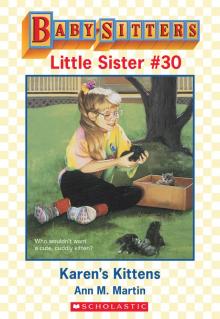 Karen's Kittens
Karen's Kittens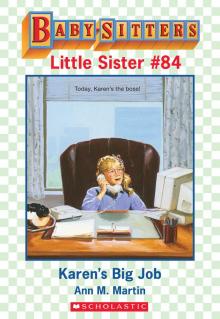 Karen's Big Job
Karen's Big Job Claudia and the Genius of Elm Street
Claudia and the Genius of Elm Street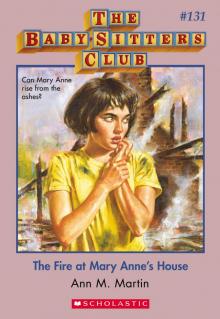 The Fire at Mary Anne's House
The Fire at Mary Anne's House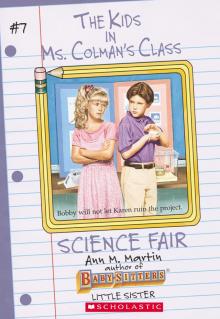 Science Fair
Science Fair Me and Katie (The Pest)
Me and Katie (The Pest)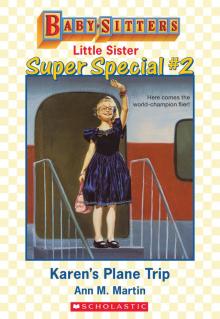 Karen's Plane Trip
Karen's Plane Trip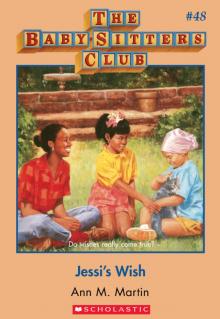 Jessi's Wish
Jessi's Wish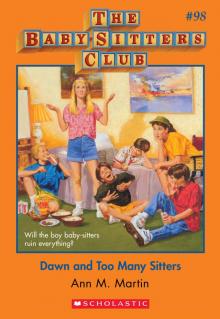 Dawn and Too Many Sitters
Dawn and Too Many Sitters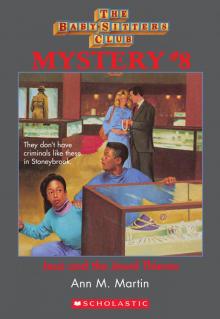 Jessi and the Jewel Thieves
Jessi and the Jewel Thieves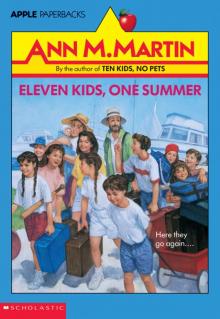 Eleven Kids, One Summer
Eleven Kids, One Summer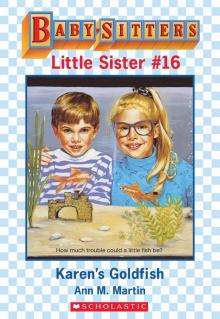 Karen's Goldfish
Karen's Goldfish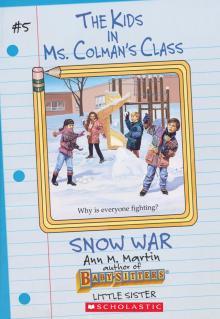 Snow War
Snow War Abby and the Secret Society
Abby and the Secret Society Keeping Secrets
Keeping Secrets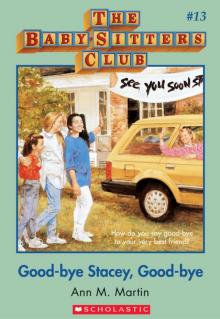 Good-Bye Stacey, Good-Bye
Good-Bye Stacey, Good-Bye Karen's Sleepover
Karen's Sleepover Claudia and the World's Cutest Baby
Claudia and the World's Cutest Baby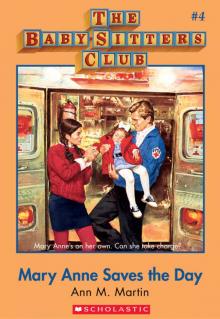 Mary Anne Saves the Day
Mary Anne Saves the Day Mallory and the Dream Horse
Mallory and the Dream Horse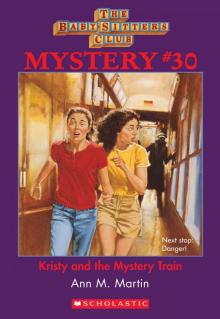 Kristy and the Mystery Train
Kristy and the Mystery Train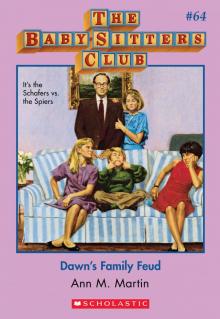 Dawn's Family Feud
Dawn's Family Feud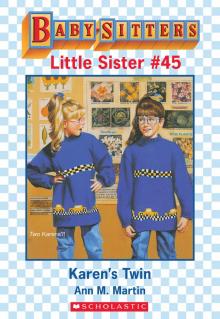 Karen's Twin
Karen's Twin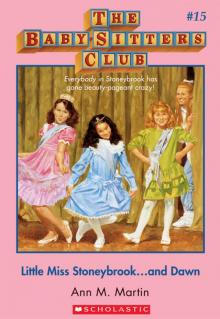 Little Miss Stoneybrook... And Dawn
Little Miss Stoneybrook... And Dawn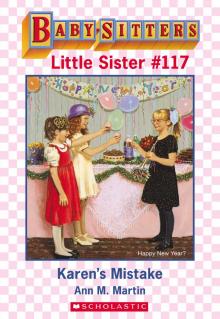 Karen's Mistake
Karen's Mistake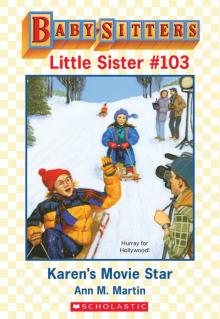 Karen's Movie Star
Karen's Movie Star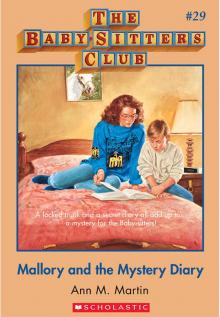 Mallory and the Mystery Diary
Mallory and the Mystery Diary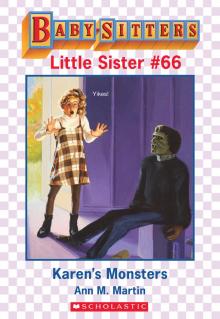 Karen's Monsters
Karen's Monsters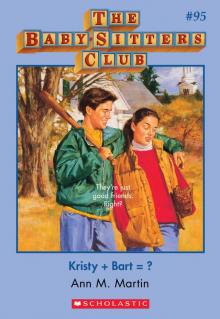 Kristy + Bart = ?
Kristy + Bart = ?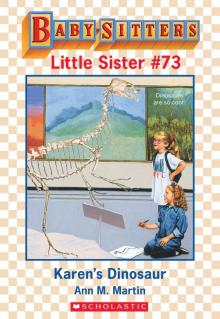 Karen's Dinosaur
Karen's Dinosaur Here Today
Here Today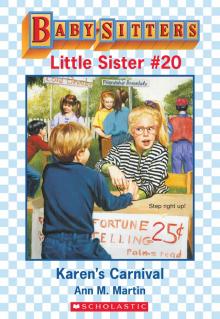 Karen's Carnival
Karen's Carnival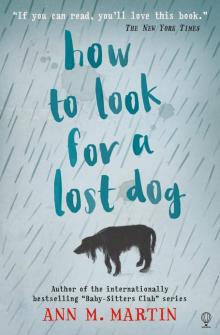 How to Look for a Lost Dog
How to Look for a Lost Dog Stacey vs. Claudia
Stacey vs. Claudia Stacey's Ex-Boyfriend
Stacey's Ex-Boyfriend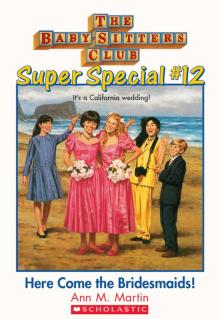 Here Come the Bridesmaids!
Here Come the Bridesmaids! Graduation Day
Graduation Day Kristy's Big News
Kristy's Big News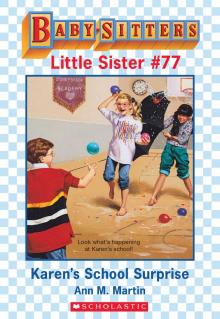 Karen's School Surprise
Karen's School Surprise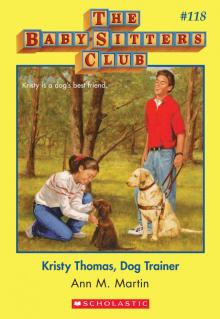 Kristy Thomas, Dog Trainer
Kristy Thomas, Dog Trainer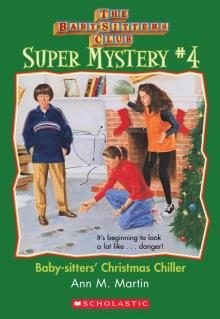 Baby-Sitters' Christmas Chiller
Baby-Sitters' Christmas Chiller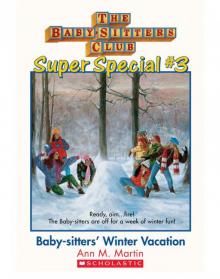 Baby-Sitters' Winter Vacation
Baby-Sitters' Winter Vacation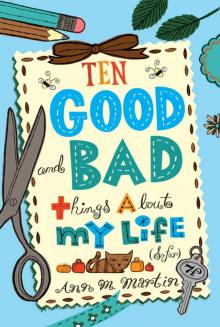 Ten Good and Bad Things About My Life
Ten Good and Bad Things About My Life Claudia and the Bad Joke
Claudia and the Bad Joke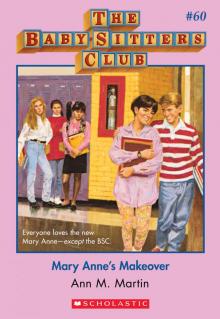 Mary Anne's Makeover
Mary Anne's Makeover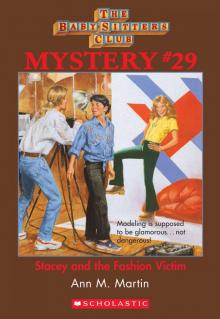 Stacey and the Fashion Victim
Stacey and the Fashion Victim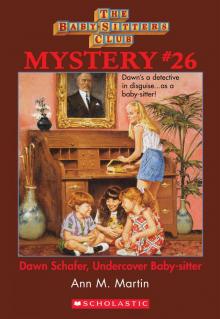 Dawn Schafer, Undercover Baby-Sitter
Dawn Schafer, Undercover Baby-Sitter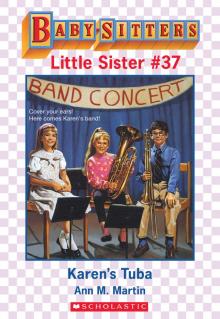 Karen's Tuba
Karen's Tuba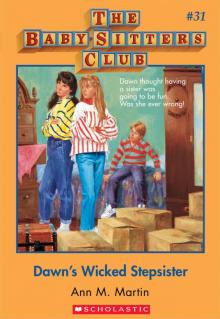 Dawn's Wicked Stepsister
Dawn's Wicked Stepsister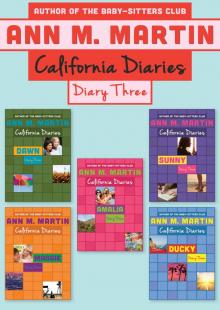 Diary Three: Dawn, Sunny, Maggie, Amalia, and Ducky
Diary Three: Dawn, Sunny, Maggie, Amalia, and Ducky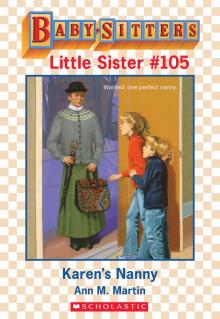 Karen's Nanny
Karen's Nanny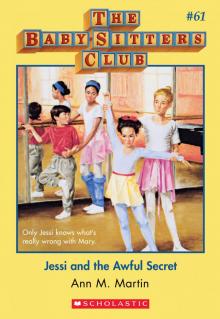 Jessi and the Awful Secret
Jessi and the Awful Secret Karen's New Year
Karen's New Year Karen's Candy
Karen's Candy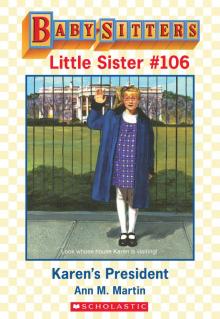 Karen's President
Karen's President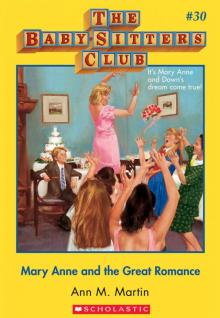 Mary Anne and the Great Romance
Mary Anne and the Great Romance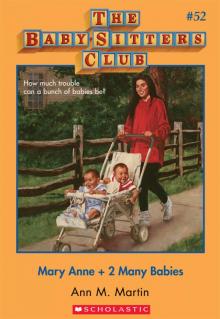 Mary Anne + 2 Many Babies
Mary Anne + 2 Many Babies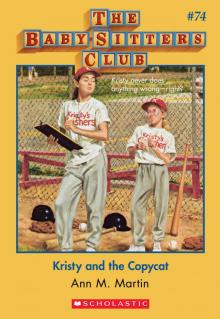 Kristy and the Copycat
Kristy and the Copycat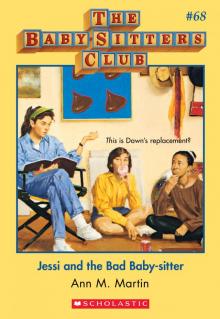 Jessi and the Bad Baby-Sitter
Jessi and the Bad Baby-Sitter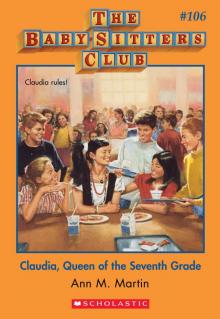 Claudia, Queen of the Seventh Grade
Claudia, Queen of the Seventh Grade Claudia and the Lighthouse Ghost
Claudia and the Lighthouse Ghost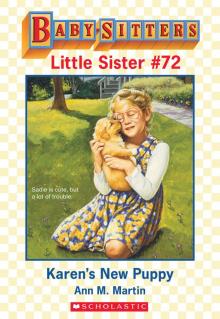 Karen's New Puppy
Karen's New Puppy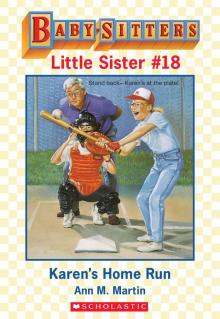 Karen's Home Run
Karen's Home Run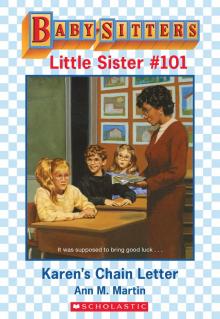 Karen's Chain Letter
Karen's Chain Letter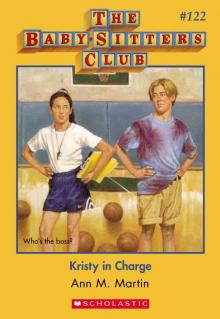 Kristy in Charge
Kristy in Charge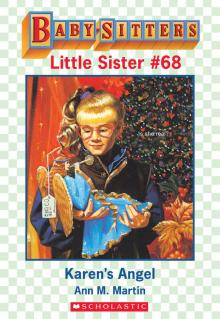 Karen's Angel
Karen's Angel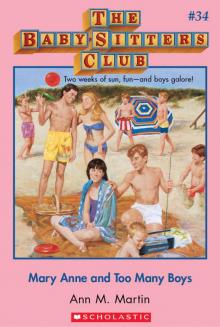 Mary Anne and Too Many Boys
Mary Anne and Too Many Boys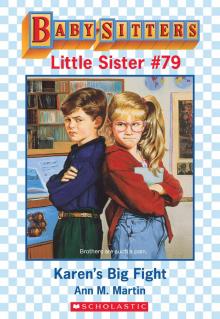 Karen's Big Fight
Karen's Big Fight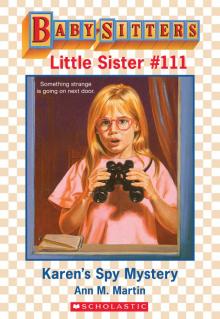 Karen's Spy Mystery
Karen's Spy Mystery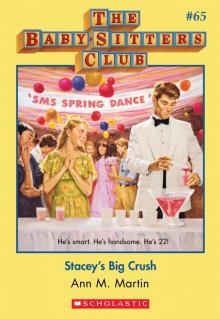 Stacey's Big Crush
Stacey's Big Crush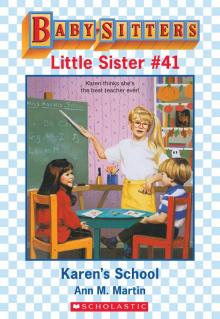 Karen's School
Karen's School Claudia and the Terrible Truth
Claudia and the Terrible Truth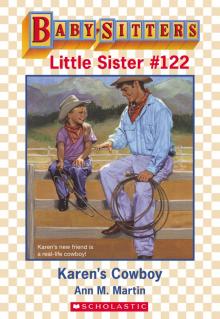 Karen's Cowboy
Karen's Cowboy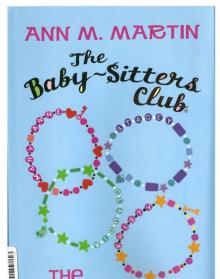 The Summer Before
The Summer Before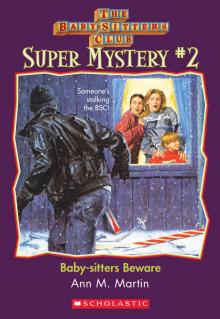 Beware, Dawn!
Beware, Dawn!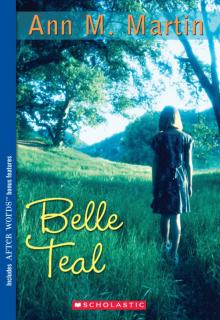 Belle Teale
Belle Teale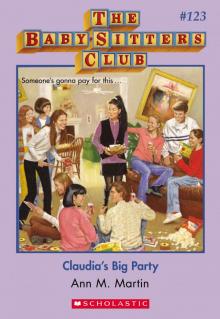 Claudia's Big Party
Claudia's Big Party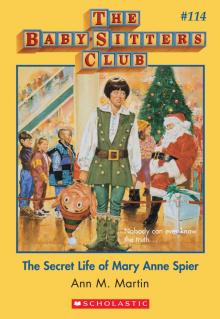 The Secret Life of Mary Anne Spier
The Secret Life of Mary Anne Spier Karen's Book
Karen's Book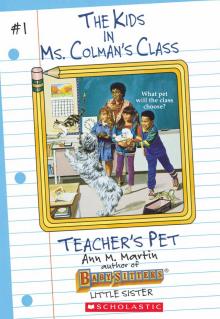 Teacher's Pet
Teacher's Pet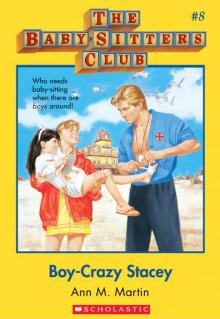 Boy-Crazy Stacey
Boy-Crazy Stacey Claudia and the Disaster Date
Claudia and the Disaster Date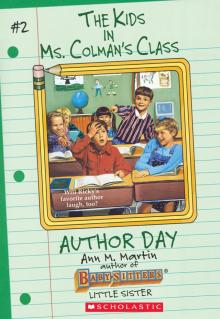 Author Day
Author Day Claudia and the Sad Good-Bye
Claudia and the Sad Good-Bye Kristy and the Worst Kid Ever
Kristy and the Worst Kid Ever Yours Turly, Shirley
Yours Turly, Shirley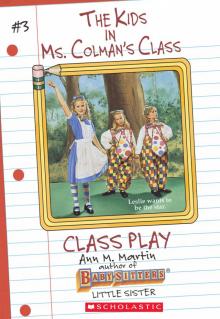 Class Play
Class Play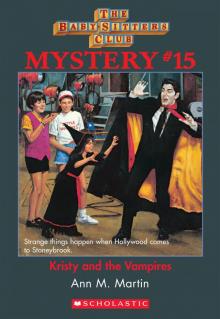 Kristy and the Vampires
Kristy and the Vampires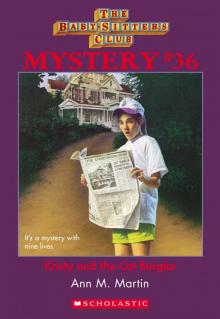 Kristy and the Cat Burglar
Kristy and the Cat Burglar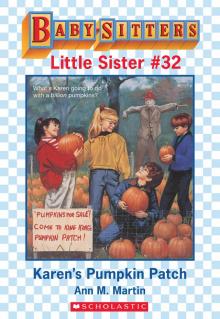 Karen's Pumpkin Patch
Karen's Pumpkin Patch Stacey and the Mystery at the Empty House
Stacey and the Mystery at the Empty House Karen's Chicken Pox
Karen's Chicken Pox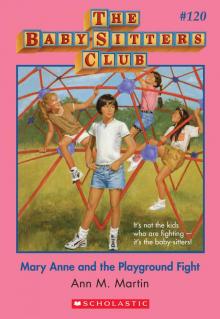 Mary Anne and the Playground Fight
Mary Anne and the Playground Fight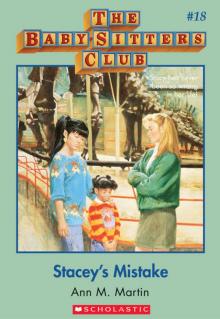 Stacey's Mistake
Stacey's Mistake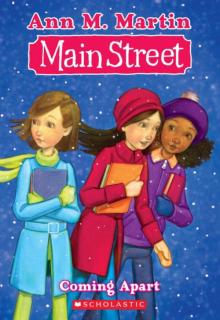 Coming Apart
Coming Apart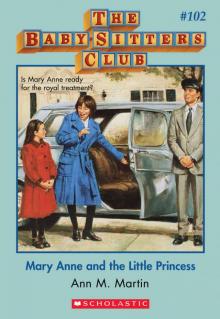 Mary Anne and the Little Princess
Mary Anne and the Little Princess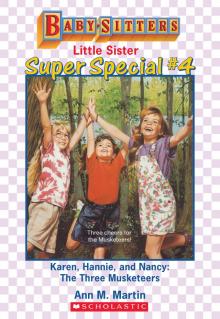 Karen, Hannie and Nancy: The Three Musketeers
Karen, Hannie and Nancy: The Three Musketeers 'Tis the Season
'Tis the Season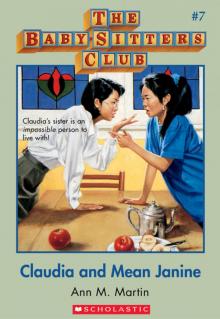 Claudia and Mean Janine
Claudia and Mean Janine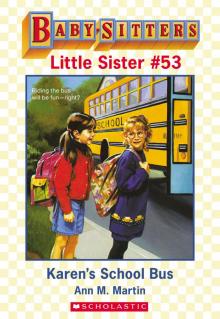 Karen's School Bus
Karen's School Bus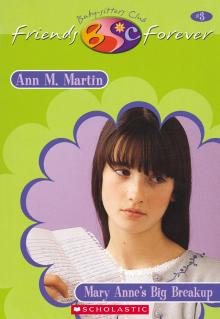 Mary Anne's Big Breakup
Mary Anne's Big Breakup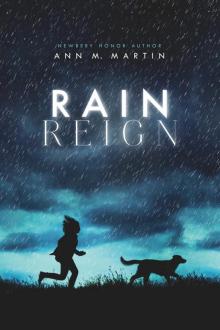 Rain Reign
Rain Reign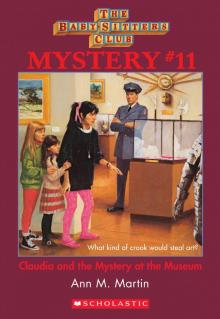 Claudia and the Mystery at the Museum
Claudia and the Mystery at the Museum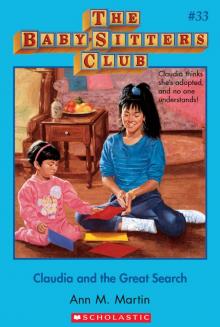 Claudia and the Great Search
Claudia and the Great Search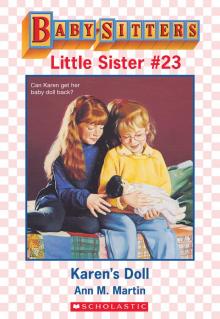 Karen's Doll
Karen's Doll Shannon's Story
Shannon's Story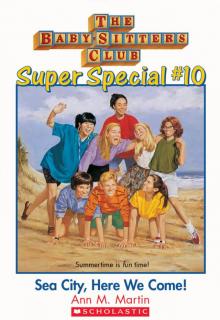 Sea City, Here We Come!
Sea City, Here We Come!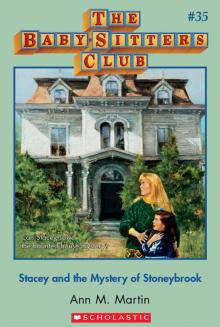 Stacey and the Mystery of Stoneybrook
Stacey and the Mystery of Stoneybrook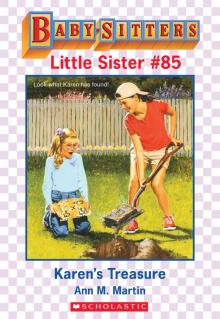 Karen's Treasure
Karen's Treasure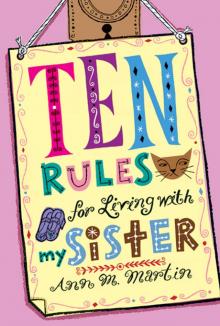 Ten Rules for Living With My Sister
Ten Rules for Living With My Sister With You and Without You
With You and Without You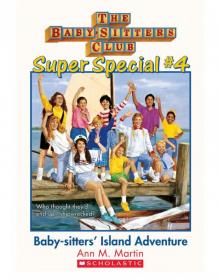 Baby-Sitters' Island Adventure
Baby-Sitters' Island Adventure Karen's Fishing Trip
Karen's Fishing Trip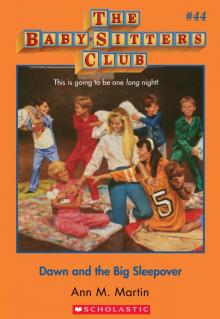 Dawn and the Big Sleepover
Dawn and the Big Sleepover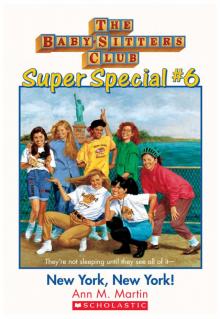 New York, New York!
New York, New York! Ten Kids, No Pets
Ten Kids, No Pets Happy Holidays, Jessi
Happy Holidays, Jessi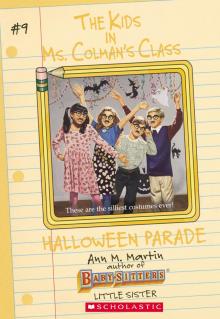 Halloween Parade
Halloween Parade Karen's New Holiday
Karen's New Holiday Kristy Power!
Kristy Power! Karen's Wish
Karen's Wish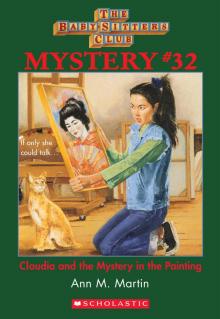 Claudia and the Mystery in the Painting
Claudia and the Mystery in the Painting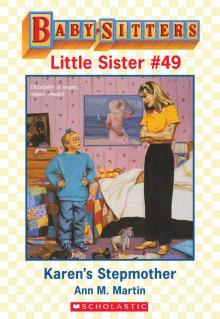 Karen's Stepmother
Karen's Stepmother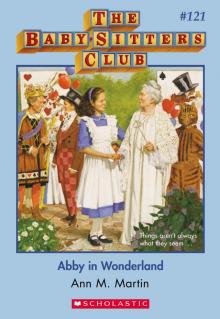 Abby in Wonderland
Abby in Wonderland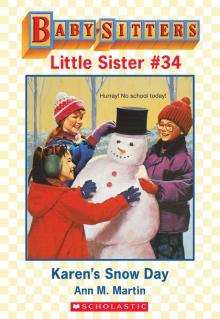 Karen's Snow Day
Karen's Snow Day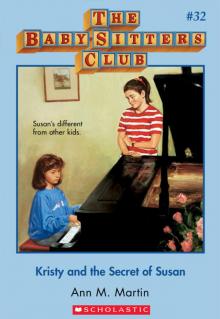 Kristy and the Secret of Susan
Kristy and the Secret of Susan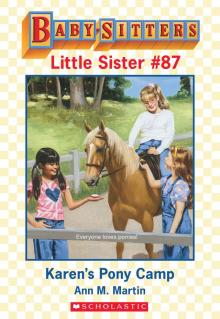 Karen's Pony Camp
Karen's Pony Camp Karen's School Trip
Karen's School Trip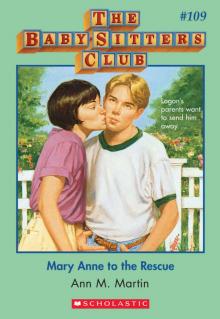 Mary Anne to the Rescue
Mary Anne to the Rescue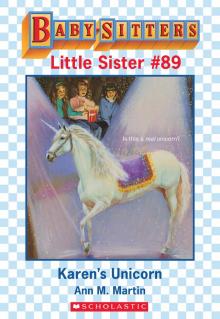 Karen's Unicorn
Karen's Unicorn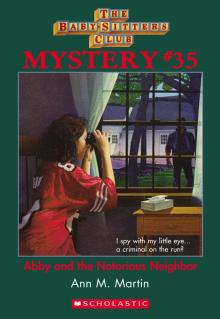 Abby and the Notorious Neighbor
Abby and the Notorious Neighbor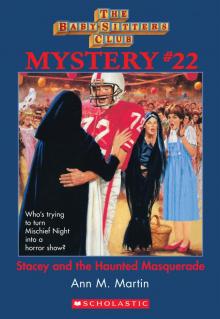 Stacey and the Haunted Masquerade
Stacey and the Haunted Masquerade Claudia Gets Her Guy
Claudia Gets Her Guy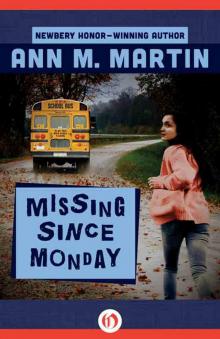 Missing Since Monday
Missing Since Monday Stacey's Choice
Stacey's Choice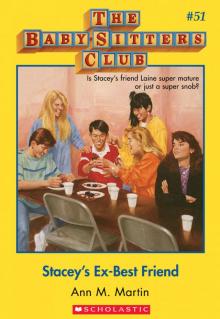 Stacey's Ex-Best Friend
Stacey's Ex-Best Friend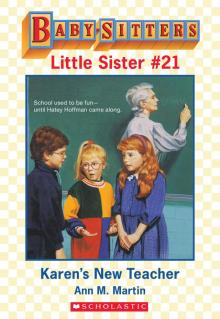 Karen's New Teacher
Karen's New Teacher Karen's Accident
Karen's Accident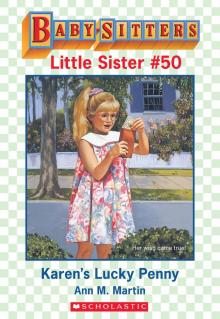 Karen's Lucky Penny
Karen's Lucky Penny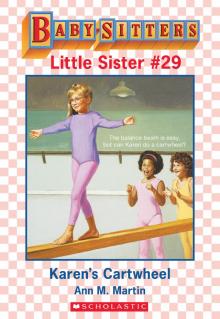 Karen's Cartwheel
Karen's Cartwheel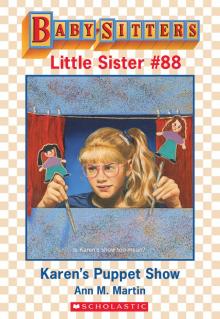 Karen's Puppet Show
Karen's Puppet Show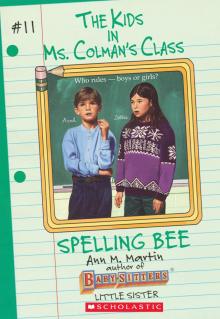 Spelling Bee
Spelling Bee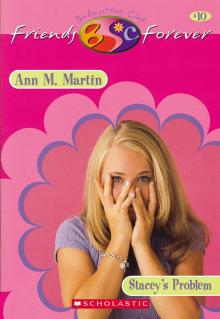 Stacey's Problem
Stacey's Problem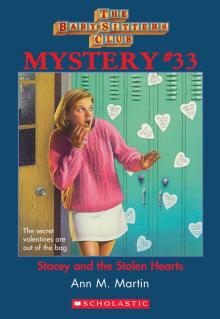 Stacey and the Stolen Hearts
Stacey and the Stolen Hearts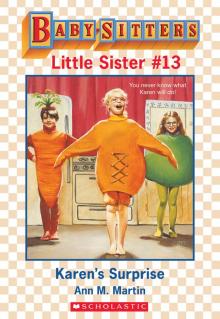 Karen's Surprise
Karen's Surprise Karen's Worst Day
Karen's Worst Day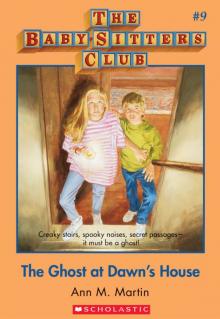 The Ghost at Dawn's House
The Ghost at Dawn's House Karen's Big Sister
Karen's Big Sister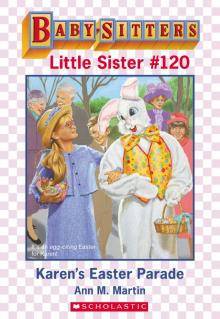 Karen's Easter Parade
Karen's Easter Parade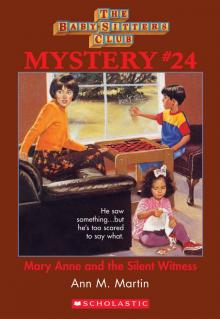 Mary Anne and the Silent Witness
Mary Anne and the Silent Witness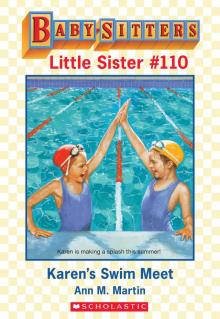 Karen's Swim Meet
Karen's Swim Meet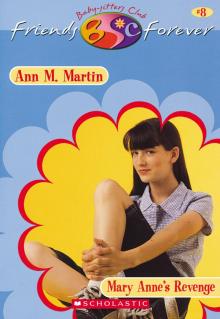 Mary Anne's Revenge
Mary Anne's Revenge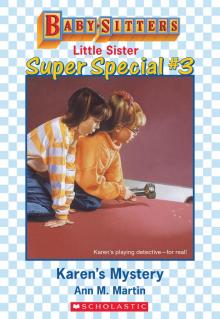 Karen's Mystery
Karen's Mystery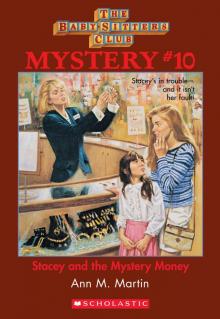 Stacey and the Mystery Money
Stacey and the Mystery Money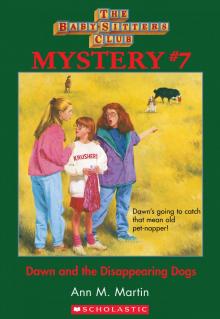 Dawn and the Disappearing Dogs
Dawn and the Disappearing Dogs Karen's Christmas Tree
Karen's Christmas Tree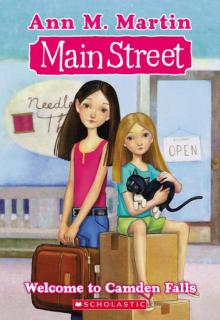 Welcome to Camden Falls
Welcome to Camden Falls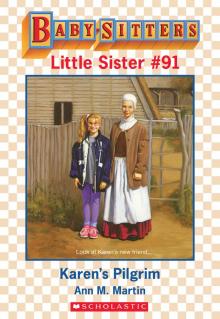 Karen's Pilgrim
Karen's Pilgrim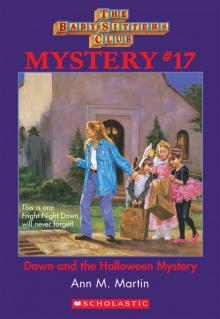 Dawn and the Halloween Mystery
Dawn and the Halloween Mystery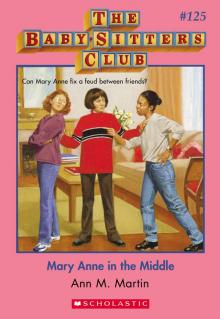 Mary Anne in the Middle
Mary Anne in the Middle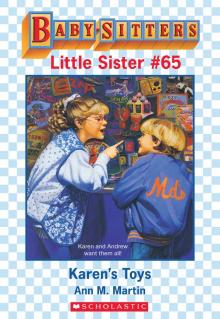 Karen's Toys
Karen's Toys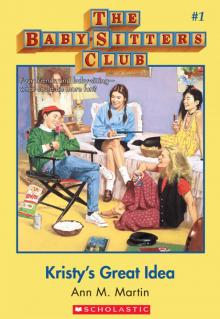 Kristy's Great Idea
Kristy's Great Idea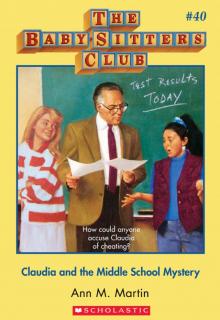 Claudia and the Middle School Mystery
Claudia and the Middle School Mystery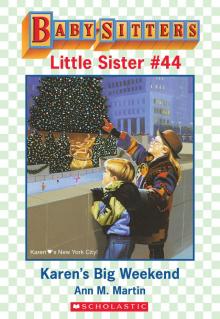 Karen's Big Weekend
Karen's Big Weekend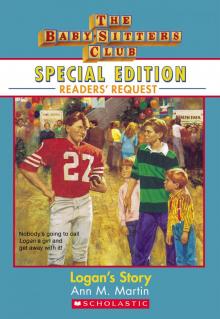 Logan's Story
Logan's Story Karen's Yo-Yo
Karen's Yo-Yo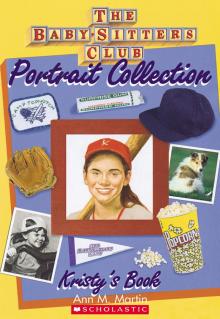 Kristy's Book
Kristy's Book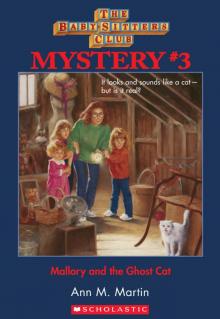 Mallory and the Ghost Cat
Mallory and the Ghost Cat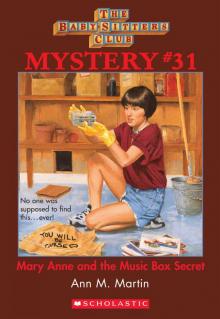 Mary Anne and the Music
Mary Anne and the Music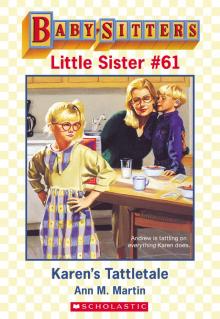 Karen's Tattletale
Karen's Tattletale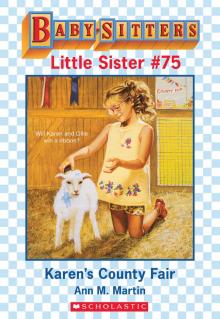 Karen's County Fair
Karen's County Fair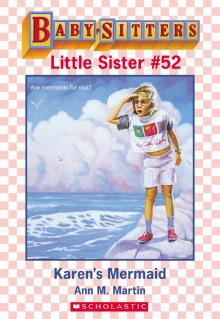 Karen's Mermaid
Karen's Mermaid Snowbound
Snowbound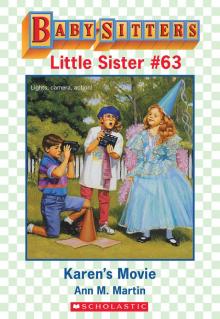 Karen's Movie
Karen's Movie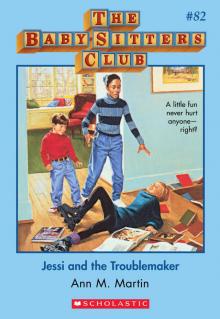 Jessi and the Troublemaker
Jessi and the Troublemaker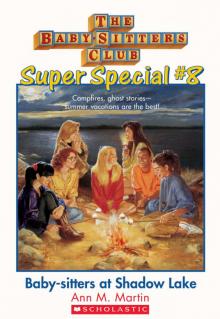 Baby-Sitters at Shadow Lake
Baby-Sitters at Shadow Lake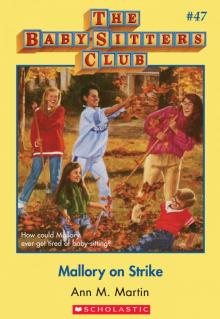 Mallory on Strike
Mallory on Strike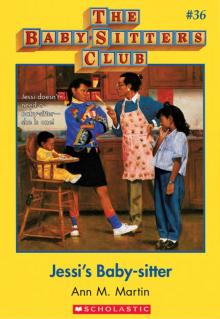 Jessi's Baby-Sitter
Jessi's Baby-Sitter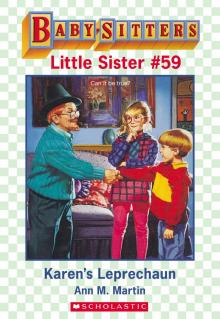 Karen's Leprechaun
Karen's Leprechaun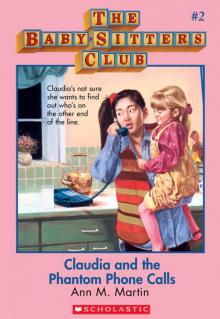 Claudia and the Phantom Phone Calls
Claudia and the Phantom Phone Calls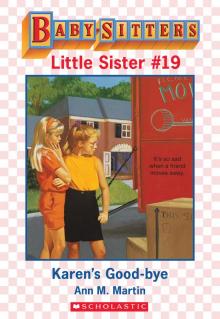 Karen's Good-Bye
Karen's Good-Bye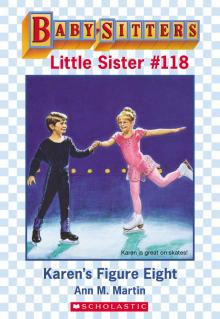 Karen's Figure Eight
Karen's Figure Eight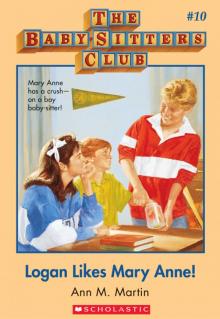 Logan Likes Mary Anne!
Logan Likes Mary Anne!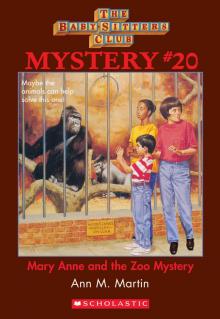 Mary Anne and the Zoo Mystery
Mary Anne and the Zoo Mystery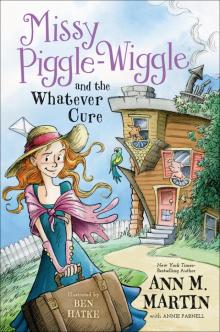 Missy Piggle-Wiggle and the Whatever Cure
Missy Piggle-Wiggle and the Whatever Cure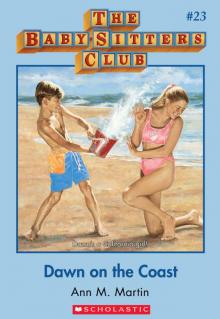 Dawn on the Coast
Dawn on the Coast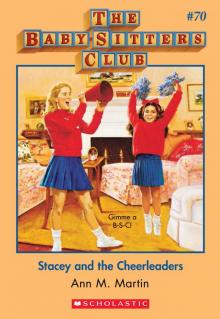 Stacey and the Cheerleaders
Stacey and the Cheerleaders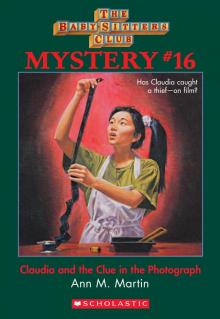 Claudia and the Clue in the Photograph
Claudia and the Clue in the Photograph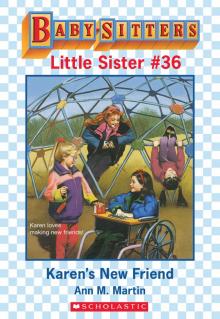 Karen's New Friend
Karen's New Friend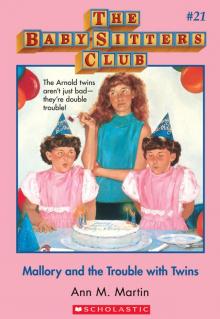 Mallory and the Trouble With Twins
Mallory and the Trouble With Twins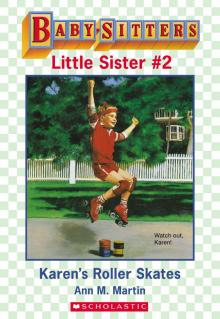 Karen's Roller Skates
Karen's Roller Skates Abby and the Best Kid Ever
Abby and the Best Kid Ever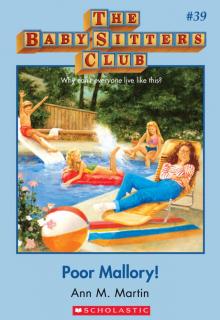 Poor Mallory!
Poor Mallory!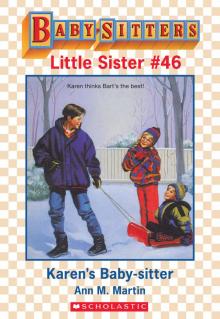 Karen's Witch
Karen's Witch Karen's Grandmothers
Karen's Grandmothers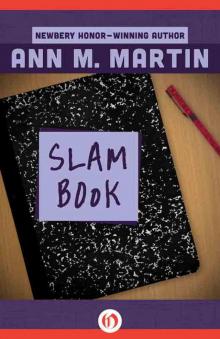 Slam Book
Slam Book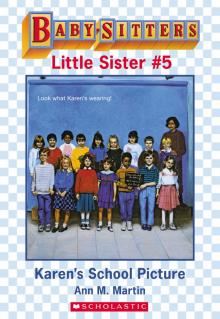 Karen's School Picture
Karen's School Picture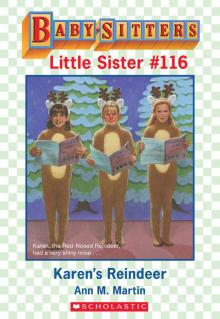 Karen's Reindeer
Karen's Reindeer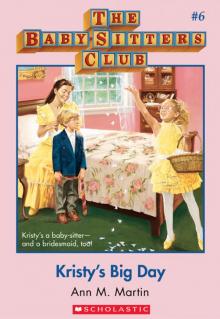 Kristy's Big Day
Kristy's Big Day The Long Way Home
The Long Way Home Karen's Sleigh Ride
Karen's Sleigh Ride On Christmas Eve
On Christmas Eve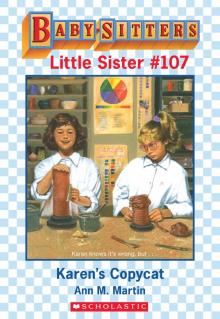 Karen's Copycat
Karen's Copycat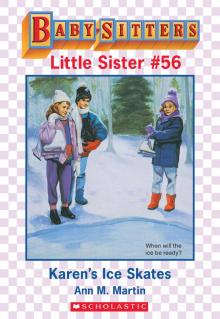 Karen's Ice Skates
Karen's Ice Skates Claudia and the Little Liar
Claudia and the Little Liar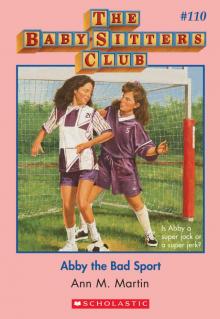 Abby the Bad Sport
Abby the Bad Sport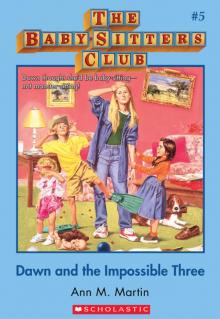 The Baby-Sitters Club #5: Dawn and the Impossible Three
The Baby-Sitters Club #5: Dawn and the Impossible Three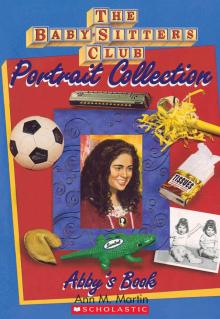 Abby's Book
Abby's Book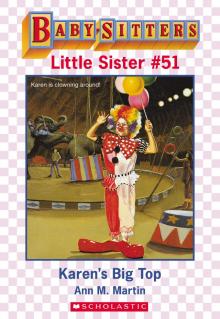 Karen's Big Top
Karen's Big Top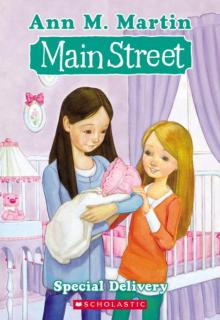 Main Street #8: Special Delivery
Main Street #8: Special Delivery Kristy and the Kidnapper
Kristy and the Kidnapper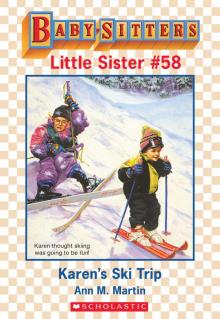 Karen's Ski Trip
Karen's Ski Trip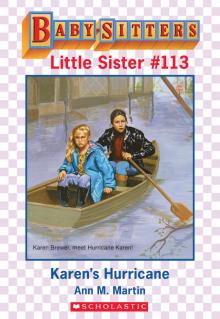 Karen's Hurricane
Karen's Hurricane Stacey and the Mystery at the Mall
Stacey and the Mystery at the Mall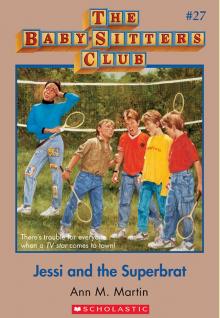 Jessi and the Superbrat
Jessi and the Superbrat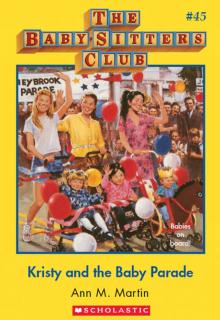 Kristy and the Baby Parade
Kristy and the Baby Parade Karen's New Bike
Karen's New Bike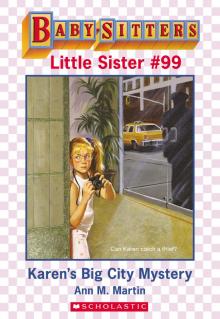 Karen's Big City Mystery
Karen's Big City Mystery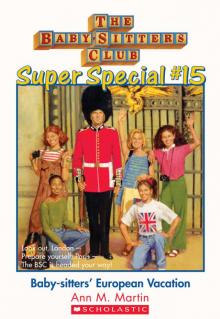 Baby-Sitters' European Vacation
Baby-Sitters' European Vacation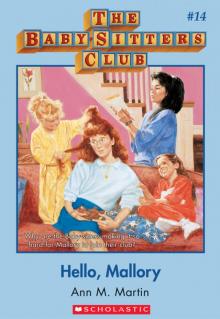 Hello, Mallory
Hello, Mallory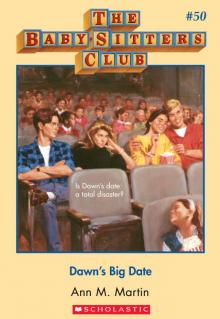 Dawn's Big Date
Dawn's Big Date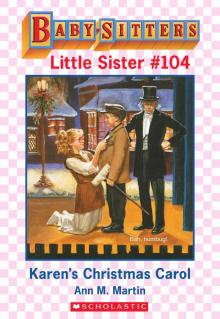 Karen's Christmas Carol
Karen's Christmas Carol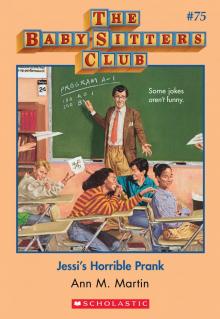 Jessi's Horrible Prank
Jessi's Horrible Prank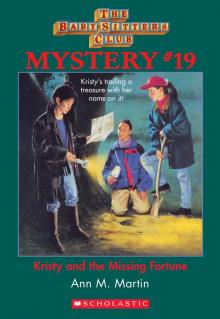 Kristy and the Missing Fortune
Kristy and the Missing Fortune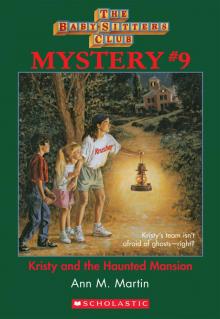 Kristy and the Haunted Mansion
Kristy and the Haunted Mansion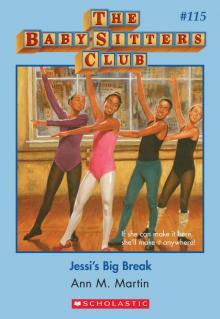 Jessi's Big Break
Jessi's Big Break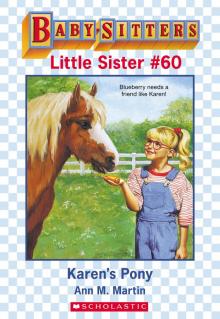 Karen's Pony
Karen's Pony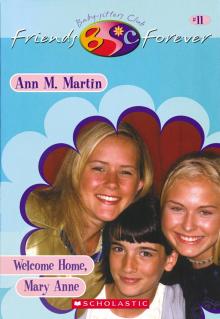 Welcome Home, Mary Anne
Welcome Home, Mary Anne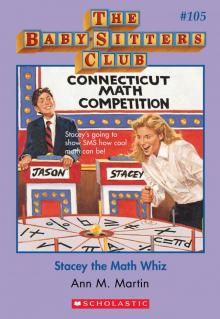 Stacey the Math Whiz
Stacey the Math Whiz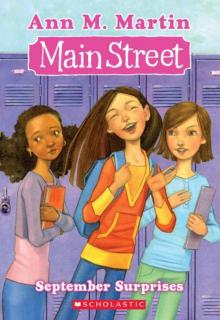 September Surprises
September Surprises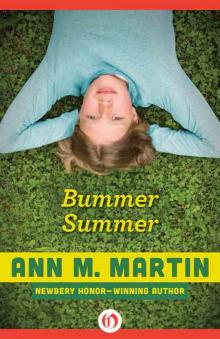 Bummer Summer
Bummer Summer Karen's Secret
Karen's Secret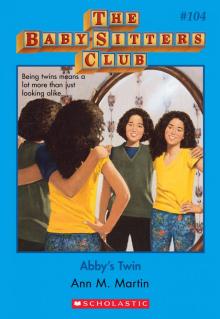 Abby's Twin
Abby's Twin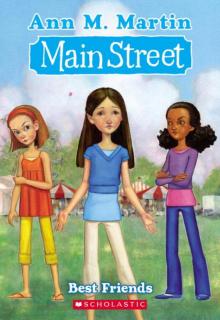 Main Street #4: Best Friends
Main Street #4: Best Friends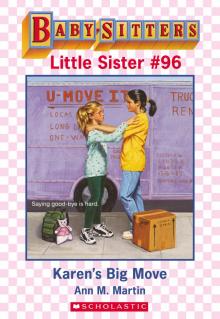 Karen's Big Move
Karen's Big Move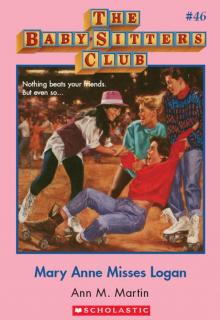 Mary Anne Misses Logan
Mary Anne Misses Logan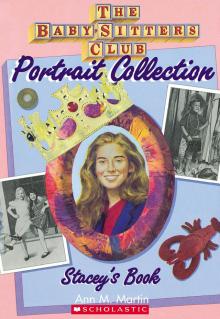 Stacey's Book
Stacey's Book Claudia and the Perfect Boy
Claudia and the Perfect Boy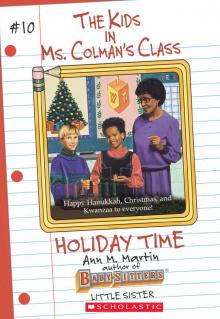 Holiday Time
Holiday Time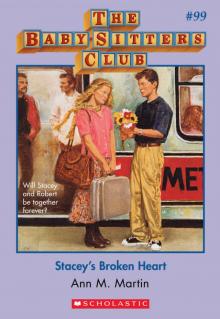 Stacey's Broken Heart
Stacey's Broken Heart Karen's Field Day
Karen's Field Day Kristy's Worst Idea
Kristy's Worst Idea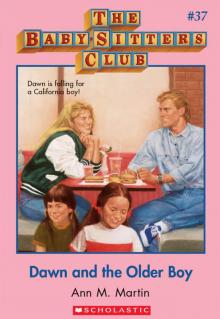 Dawn and the Older Boy
Dawn and the Older Boy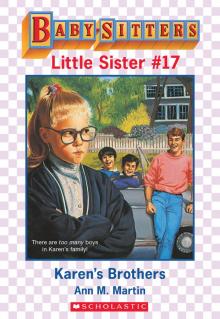 Karen's Brothers
Karen's Brothers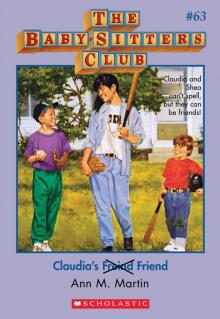 Claudia's Friend
Claudia's Friend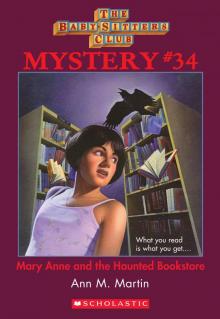 Mary Anne and the Haunted Bookstore
Mary Anne and the Haunted Bookstore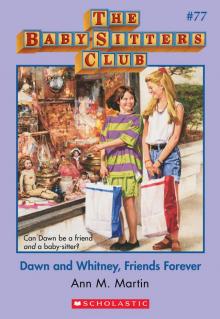 Dawn and Whitney, Friends Forever
Dawn and Whitney, Friends Forever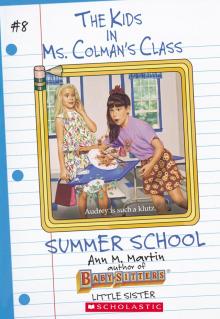 Summer School
Summer School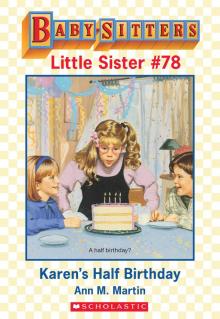 Karen's Birthday
Karen's Birthday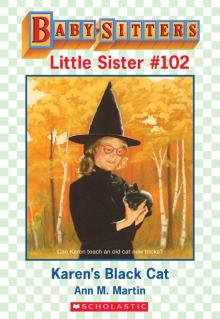 Karen's Black Cat
Karen's Black Cat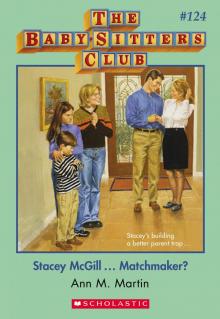 Stacey McGill... Matchmaker?
Stacey McGill... Matchmaker?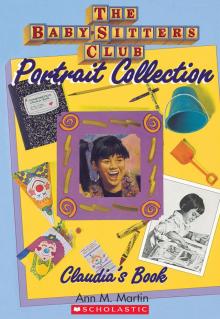 Claudia's Book
Claudia's Book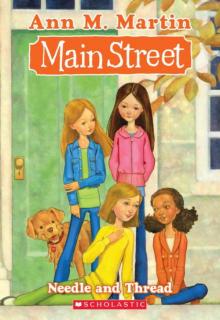 Main Street #2: Needle and Thread
Main Street #2: Needle and Thread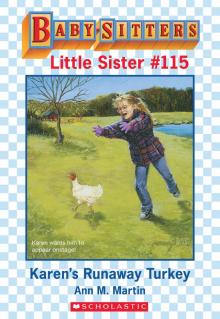 Karen's Runaway Turkey
Karen's Runaway Turkey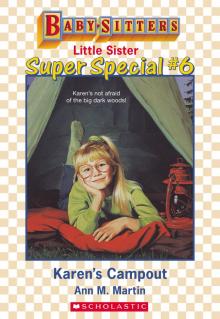 Karen's Campout
Karen's Campout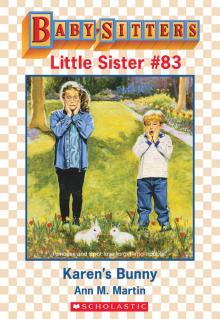 Karen's Bunny
Karen's Bunny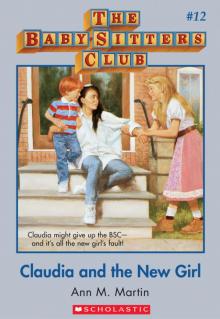 Claudia and the New Girl
Claudia and the New Girl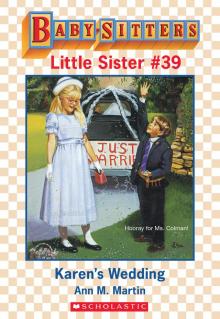 Karen's Wedding
Karen's Wedding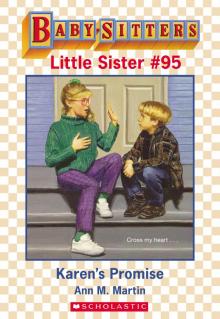 Karen's Promise
Karen's Promise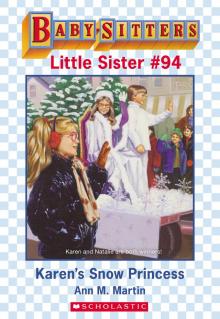 Karen's Snow Princess
Karen's Snow Princess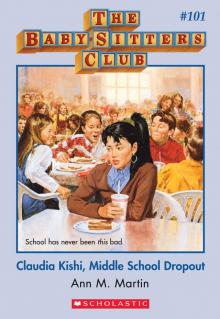 Claudia Kishi, Middle School Dropout
Claudia Kishi, Middle School Dropout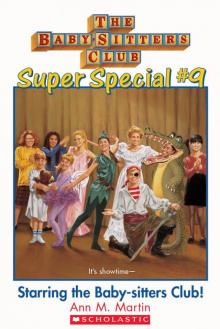 Starring the Baby-Sitters Club!
Starring the Baby-Sitters Club!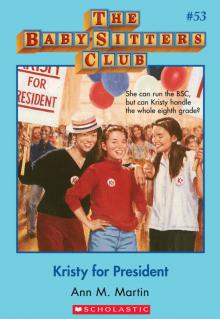 Kristy for President
Kristy for President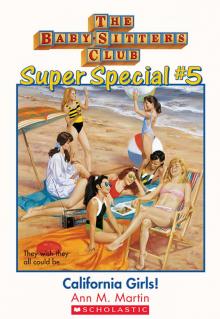 California Girls!
California Girls!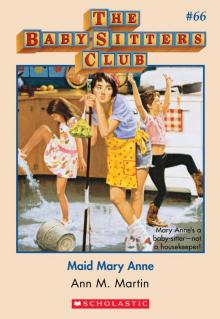 Maid Mary Anne
Maid Mary Anne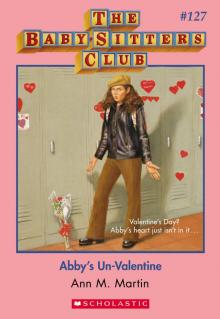 Abby's Un-Valentine
Abby's Un-Valentine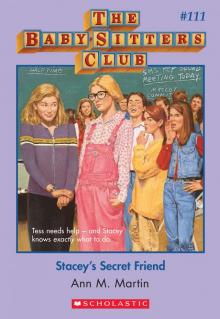 Stacey's Secret Friend
Stacey's Secret Friend Karen's Haunted House
Karen's Haunted House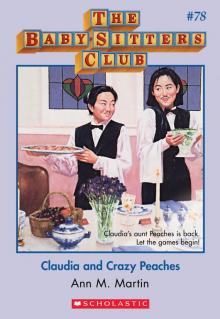 Claudia and Crazy Peaches
Claudia and Crazy Peaches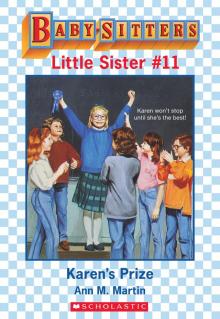 Karen's Prize
Karen's Prize Get Well Soon, Mallory!
Get Well Soon, Mallory!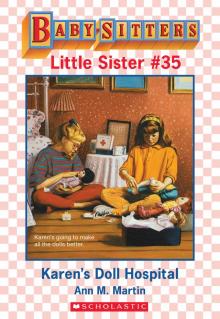 Karen's Doll Hospital
Karen's Doll Hospital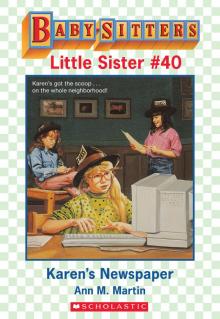 Karen's Newspaper
Karen's Newspaper Karen's Toothache
Karen's Toothache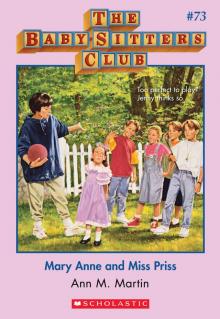 Mary Anne and Miss Priss
Mary Anne and Miss Priss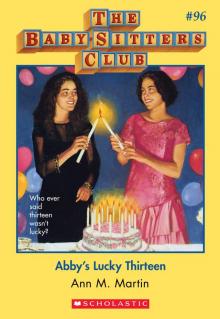 Abby's Lucky Thirteen
Abby's Lucky Thirteen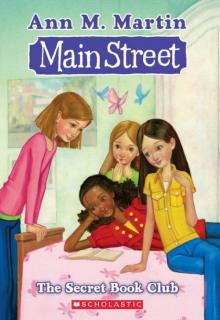 The Secret Book Club
The Secret Book Club The All-New Mallory Pike
The All-New Mallory Pike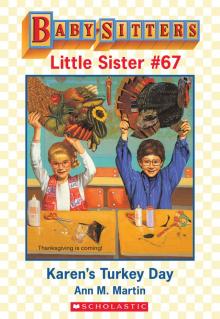 Karen's Turkey Day
Karen's Turkey Day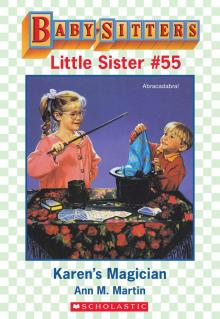 Karen's Magician
Karen's Magician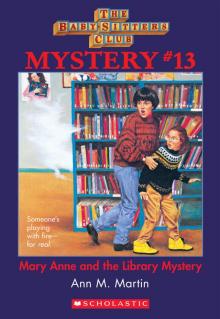 Mary Anne and the Library Mystery
Mary Anne and the Library Mystery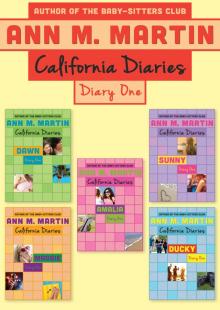 Diary One: Dawn, Sunny, Maggie, Amalia, and Ducky
Diary One: Dawn, Sunny, Maggie, Amalia, and Ducky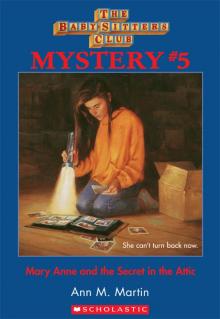 Mary Anne and the Secret in the Attic
Mary Anne and the Secret in the Attic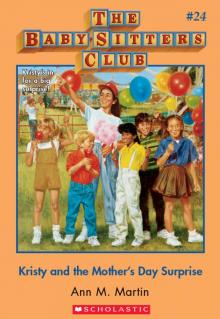 Kristy and the Mother's Day Surprise
Kristy and the Mother's Day Surprise Karen's in Love
Karen's in Love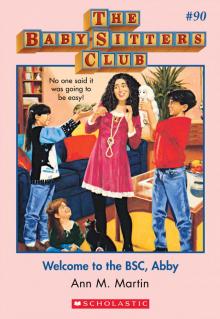 Welcome to the BSC, Abby
Welcome to the BSC, Abby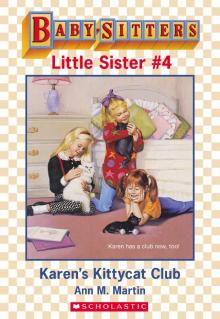 Karen's Kittycat Club
Karen's Kittycat Club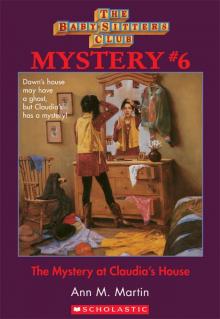 The Mystery at Claudia's House
The Mystery at Claudia's House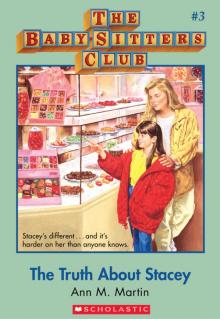 The Truth About Stacey
The Truth About Stacey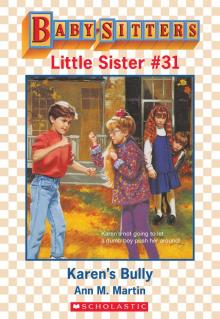 Karen's Bully
Karen's Bully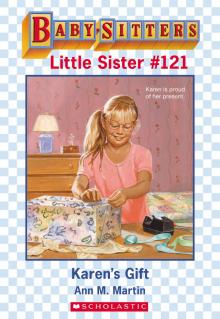 Karen's Gift
Karen's Gift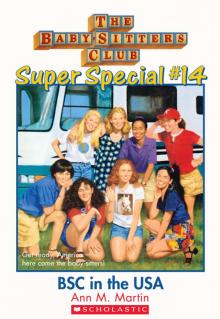 BSC in the USA
BSC in the USA Everything for a Dog
Everything for a Dog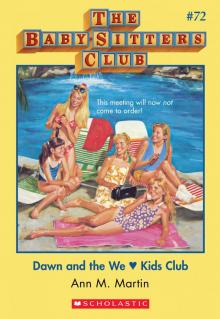 Dawn and the We Love Kids Club
Dawn and the We Love Kids Club Karen's Ghost
Karen's Ghost Stacey's Lie
Stacey's Lie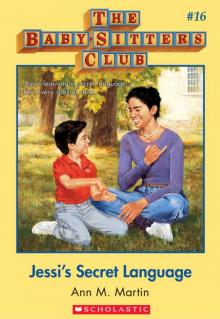 Jessi's Secret Language
Jessi's Secret Language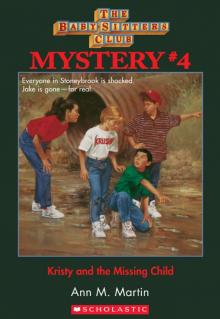 Kristy and the Missing Child
Kristy and the Missing Child Better to Wish
Better to Wish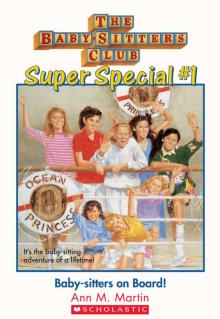 Baby-Sitters on Board!
Baby-Sitters on Board!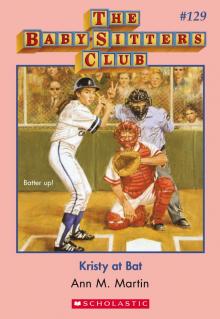 Kristy at Bat
Kristy at Bat Everything Changes
Everything Changes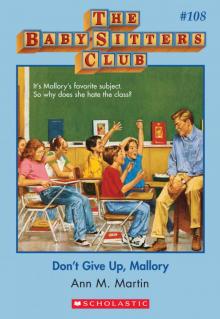 Don't Give Up, Mallory
Don't Give Up, Mallory A Dog's Life: The Autobiography of a Stray
A Dog's Life: The Autobiography of a Stray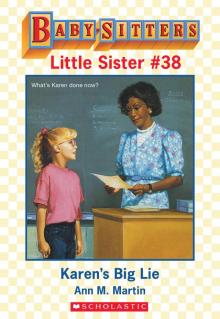 Karen's Big Lie
Karen's Big Lie Karen's Show and Share
Karen's Show and Share Mallory Hates Boys (and Gym)
Mallory Hates Boys (and Gym)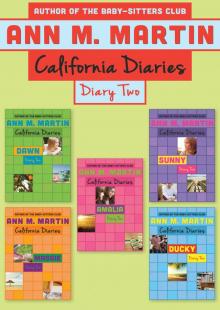 Diary Two: Dawn, Sunny, Maggie, Amalia, and Ducky
Diary Two: Dawn, Sunny, Maggie, Amalia, and Ducky Karen's Pen Pal
Karen's Pen Pal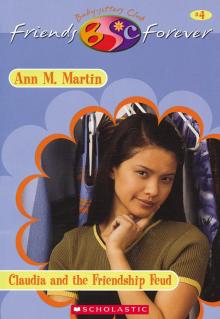 Claudia and the Friendship Feud
Claudia and the Friendship Feud Karen's Secret Valentine
Karen's Secret Valentine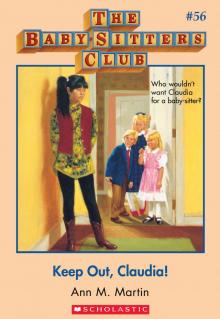 Keep Out, Claudia!
Keep Out, Claudia! Aloha, Baby-Sitters!
Aloha, Baby-Sitters!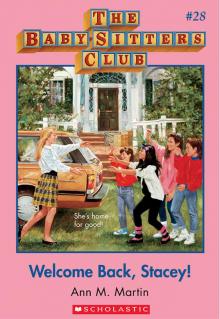 Welcome Back, Stacey
Welcome Back, Stacey Jessi Ramsey, Pet-Sitter
Jessi Ramsey, Pet-Sitter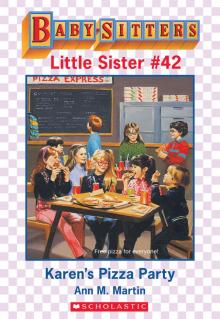 Karen's Pizza Party
Karen's Pizza Party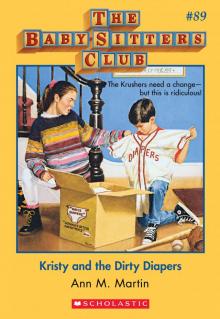 Kristy and the Dirty Diapers
Kristy and the Dirty Diapers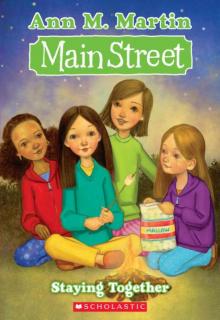 Staying Together
Staying Together Dawn and the Surfer Ghost
Dawn and the Surfer Ghost Claudia Makes Up Her Mind
Claudia Makes Up Her Mind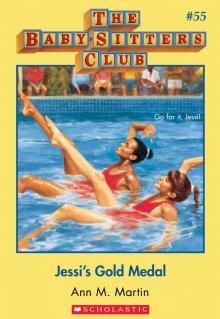 Jessi's Gold Medal
Jessi's Gold Medal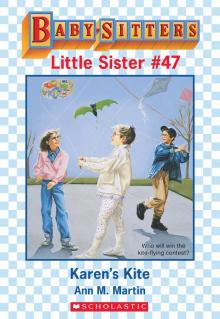 Karen's Kite
Karen's Kite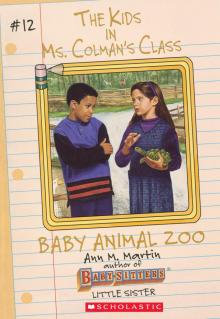 Baby Animal Zoo
Baby Animal Zoo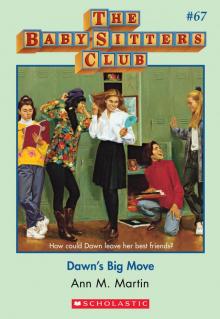 Dawn's Big Move
Dawn's Big Move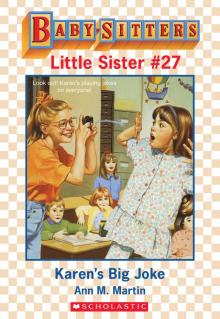 Karen's Big Joke
Karen's Big Joke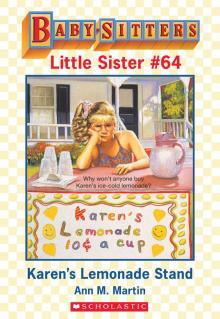 Karen's Lemonade Stand
Karen's Lemonade Stand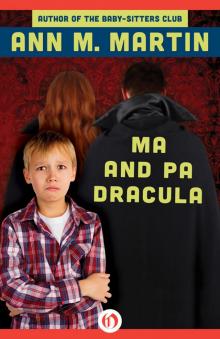 Ma and Pa Dracula
Ma and Pa Dracula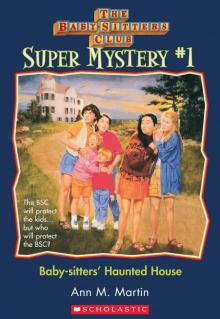 Baby-Sitters' Haunted House
Baby-Sitters' Haunted House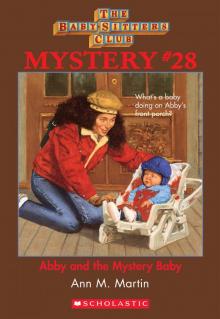 Abby and the Mystery Baby
Abby and the Mystery Baby Home Is the Place
Home Is the Place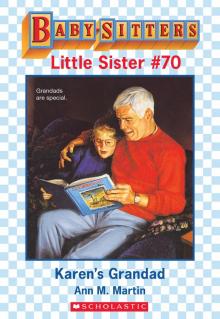 Karen's Grandad
Karen's Grandad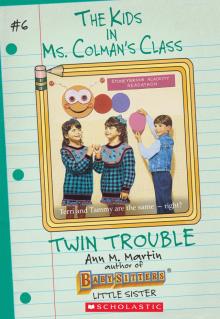 Twin Trouble
Twin Trouble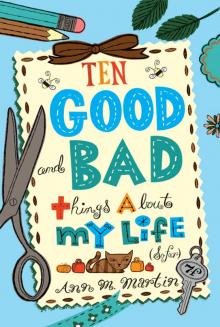 Ten Good and Bad Things About My Life (So Far)
Ten Good and Bad Things About My Life (So Far)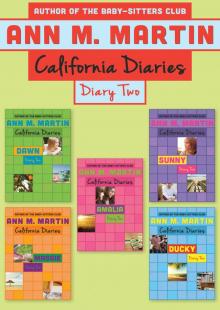 Diary Two
Diary Two Baby-Sitters Club 027
Baby-Sitters Club 027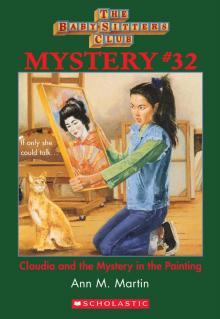 Claudia and the Mystery Painting
Claudia and the Mystery Painting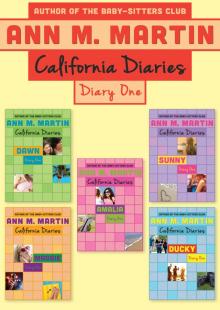 Diary One
Diary One Baby-Sitters Club 037
Baby-Sitters Club 037 Baby-Sitters Club 028
Baby-Sitters Club 028 Baby-Sitters Club 085
Baby-Sitters Club 085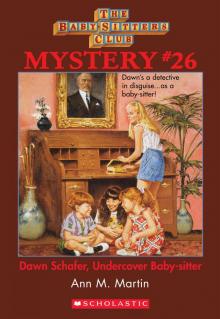 Dawn Schaffer Undercover Baby-Sitter
Dawn Schaffer Undercover Baby-Sitter Jessi's Babysitter
Jessi's Babysitter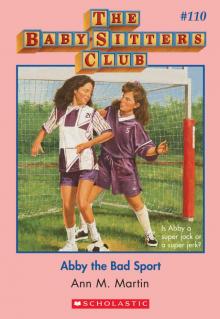 The Baby-Sitters Club #110: Abby the Bad Sport (Baby-Sitters Club, The)
The Baby-Sitters Club #110: Abby the Bad Sport (Baby-Sitters Club, The) Karen's Little Sister
Karen's Little Sister Baby-Sitters Club 058
Baby-Sitters Club 058 Claudia And The Genius On Elm St.
Claudia And The Genius On Elm St. Missy Piggle-Wiggle and the Sticky-Fingers Cure
Missy Piggle-Wiggle and the Sticky-Fingers Cure Kristy and Kidnapper
Kristy and Kidnapper Baby-Sitters Club 041
Baby-Sitters Club 041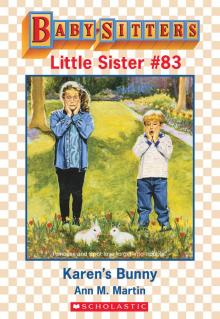 Karen's Bunny Trouble
Karen's Bunny Trouble Baby-Sitters Club 032
Baby-Sitters Club 032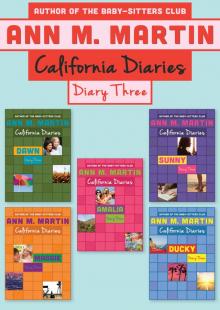 Diary Three
Diary Three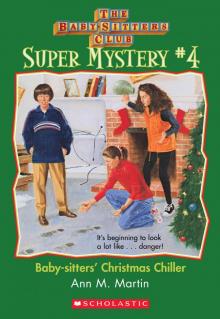 Christmas Chiller
Christmas Chiller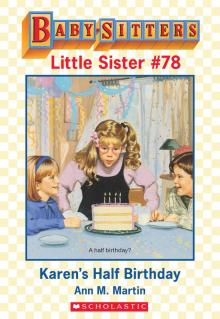 Karen's Half-Birthday
Karen's Half-Birthday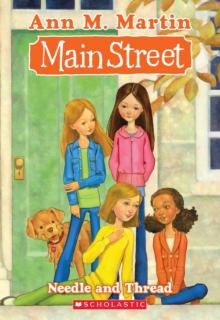 Needle and Thread
Needle and Thread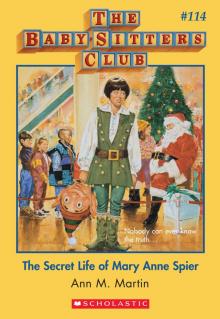 Secret Life of Mary Anne Spier
Secret Life of Mary Anne Spier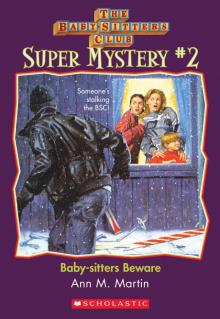 Baby-Sitters Beware
Baby-Sitters Beware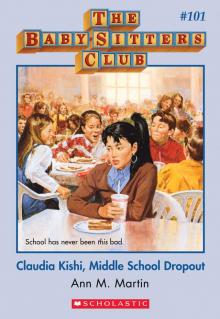 Claudia Kishi, Middle School Drop-Out
Claudia Kishi, Middle School Drop-Out Logan Likes Mary Anne !
Logan Likes Mary Anne ! Baby-Sitters Club 061
Baby-Sitters Club 061 Best Friends
Best Friends Baby-Sitters Club 031
Baby-Sitters Club 031 Karen's Little Witch
Karen's Little Witch Jessi Ramsey, Petsitter
Jessi Ramsey, Petsitter Baby-Sitters Club 123
Baby-Sitters Club 123 Baby-Sitters Club 059
Baby-Sitters Club 059 Baby-Sitters Club 033
Baby-Sitters Club 033 Baby-Sitters Club 060
Baby-Sitters Club 060 Baby-Sitters Club 094
Baby-Sitters Club 094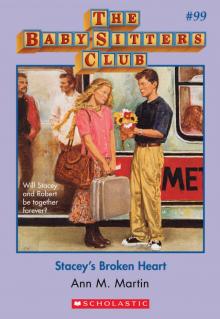 The Baby-Sitters Club #99: Stacey's Broken Heart
The Baby-Sitters Club #99: Stacey's Broken Heart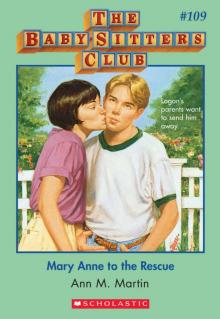 The Baby-Sitters Club #109: Mary Anne to the Rescue (Baby-Sitters Club, The)
The Baby-Sitters Club #109: Mary Anne to the Rescue (Baby-Sitters Club, The) Mystery At Claudia's House
Mystery At Claudia's House Claudia And The Sad Goodbye
Claudia And The Sad Goodbye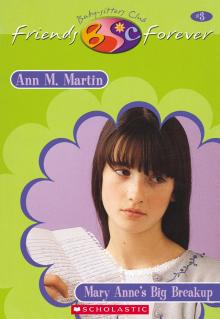 Mary Anne's Big Break-Up
Mary Anne's Big Break-Up Baby-Sitters Club 025
Baby-Sitters Club 025 Baby-Sitters Club 042
Baby-Sitters Club 042 Stacey and the Mystery of the Empty House
Stacey and the Mystery of the Empty House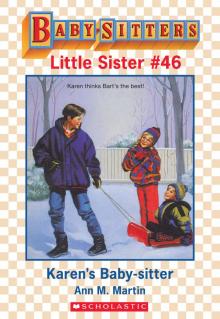 Karen's Baby-Sitter
Karen's Baby-Sitter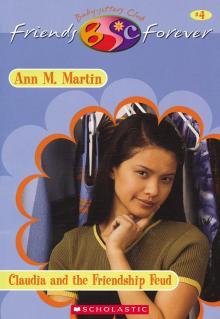 Claudia's Friendship Feud
Claudia's Friendship Feud Baby-Sitters Club 090
Baby-Sitters Club 090 Baby-Sitters Club 021
Baby-Sitters Club 021 Baby-Sitters Club 056
Baby-Sitters Club 056 Baby-Sitters Club 040
Baby-Sitters Club 040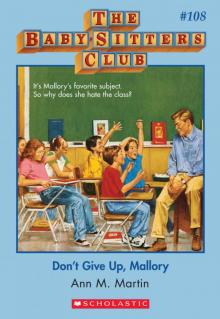 The Baby-Sitters Club #108: Don't Give Up, Mallory (Baby-Sitters Club, The)
The Baby-Sitters Club #108: Don't Give Up, Mallory (Baby-Sitters Club, The)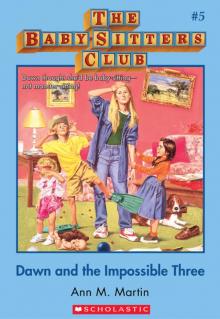 Dawn and the Impossible Three
Dawn and the Impossible Three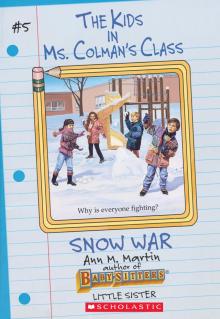 The Snow War
The Snow War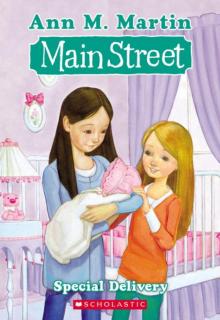 Special Delivery
Special Delivery Baby-Sitters Club 057
Baby-Sitters Club 057 Mary Anne And Too Many Babies
Mary Anne And Too Many Babies Baby-Sitters Club 030
Baby-Sitters Club 030